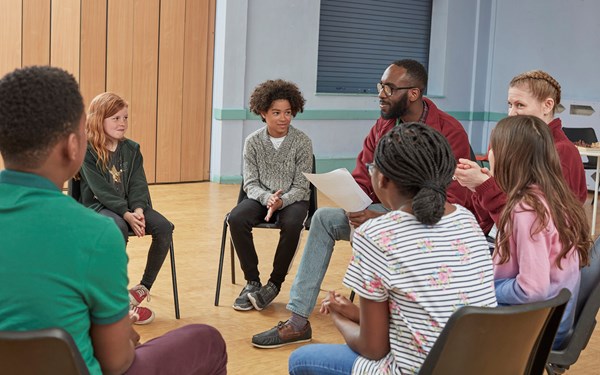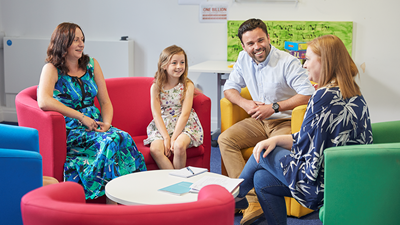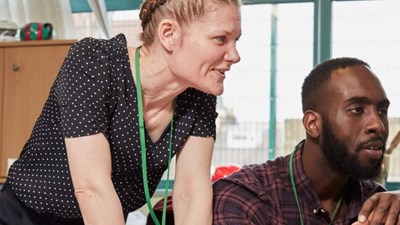We're committed to being there for every child and young person.
Here at the NSPCC, everything we do is to protect children and prevent abuse. That’s why our commitment to equality, diversity and inclusion (EDI) is so important. We can only be here for every child if we meaningfully include and champion diversity in our staff, volunteers, supporters, partners and service users. Read our action plan for the next 3 years to see how we're making the NSPCC more inclusive and equal.
EDI is at the heart of what we do
Child abuse can affect any child, whatever their background.

It’s a universal issue that can only be tackled through collective responsibility. But how can we reach every child from every diverse background if we’re not a diverse and inclusive organisation?
The key to breaking down barriers and prejudice, and creating an equal and fair society, is that it must start with us. We’re making good progress and moving in the right direction, but we know there’s more work to do.
We’re creating a sense of belonging, where everyone can say the NSPCC is ‘for me’

We want people to join us because they can be their authentic, true selves and be valued for who they are. Everyone should be free from barriers so that they can grow personally and professionally, and so they can play their part in the fight for every childhood.
However, we also work hard on creating inclusive leadership. We need to build on the work we’ve started with our executive board, our board of trustees and our leadership team. Our leaders will create an environment where people feel they belong, so we can attract a diverse range of people to protect children and prevent abuse.
EDI is the responsibility of everyone and, if embedded in the right way, it benefits everyone.
Our EDI vision
We believe that this is something we can do, together.
"Together, we can remove real and perceived barriers, valuing everybody who volunteers with, works for, supports or benefits from our work."
The NSPCC's EDI vision
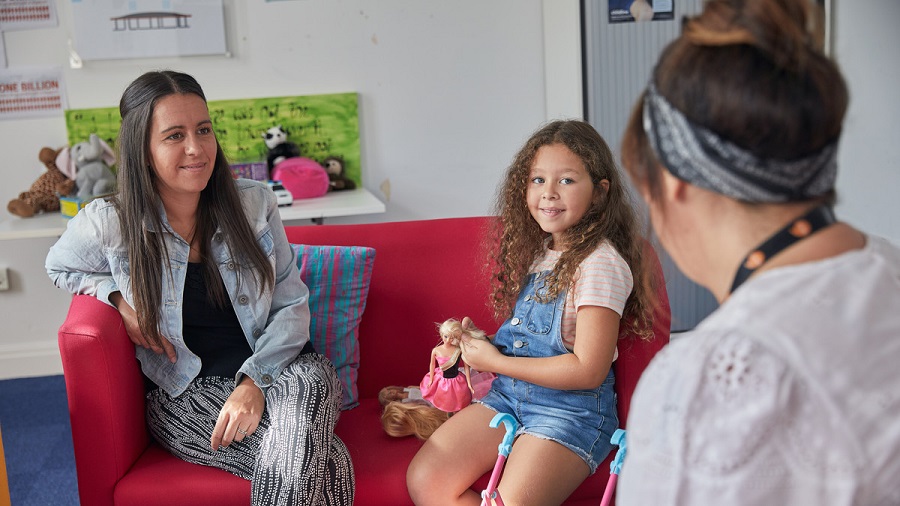
We're guided by the following five principles:
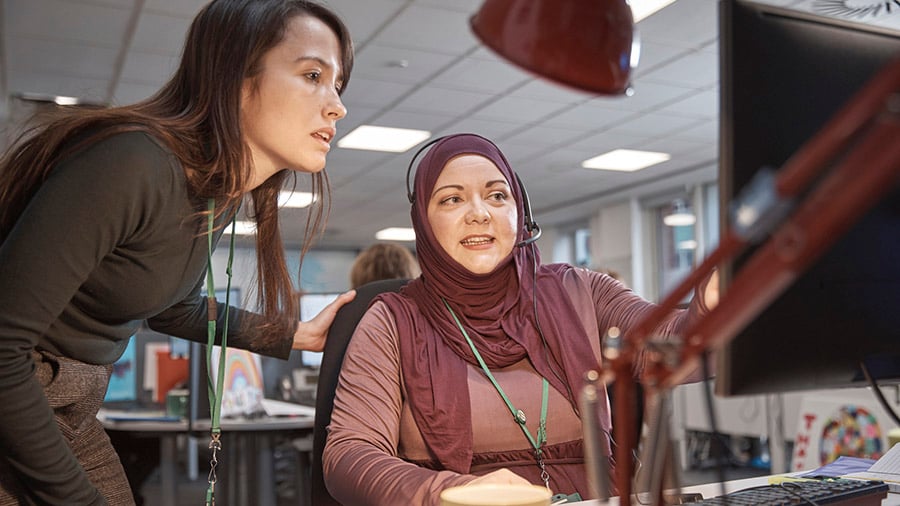
We publicly share our diversity data – in relation to our workforce and, where we’re able to, those we are here to serve and support.
Read our first ever diversity pay gap report – along with our past pay gap reports – to see how we're taking on inequality at the NSPCC.

We may not always get it right, but we acknowledge when we get it wrong. And we promise to learn from this so we can avoid repeating the same mistakes.
Being more inclusive in our recruitment process and in our leadership is a priority this year and for the next 5 years.
We don’t always have all the answers. But when we don’t know the answers, we ask the right questions and work with the right people to become better informed.
"Most people who’re offensive to other people are either uneducated about it or are just scared of it, and they retaliate in a negative way because that’s human instinct."
Blue in conversation with his mother Karen Squillino, Local Services Director.
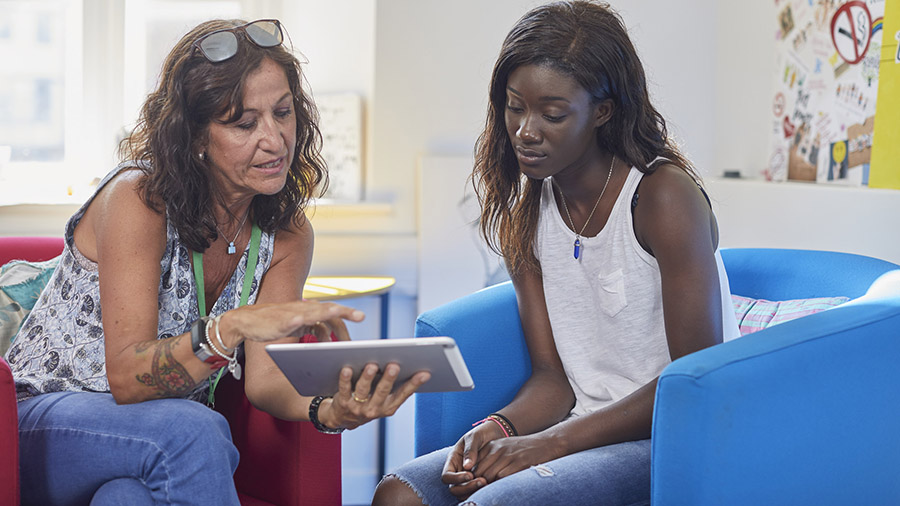
We work with and alongside others in partnership to champion and learn from their experiences, expertise and insight. By standing with and amplifying the work of others we achieve far more than we can alone.
Our Young People's Board for Change is a group of young people from across the UK, aged 13-16 years who we work with to steer, advise on and influence our work.

We are committed to making a positive change in the world. We use knowledge learned from our people, our partners, and those we are here to support. This lets us be more focused and effective in how we reach different people with our resources and services.
Our progress so far
Some of the EDI actions we’ve been embedding
- We’ve introduced mandatory unconscious bias training for all staff, and made it available for volunteers.
- We’ve rolled out a webinar for managers on mental health and wellbeing in the workplace and we’ll be bringing in more recruitment training around EDI.
- We advertise all job roles on specialist websites (such as lgbt.jobs.org, disability.jobs.org and bme.jobs.org)
- We use anonymous sifting when recruiting.
- We now have a new programme manager dedicated to EDI, and a new EDI trustee lead.
- We've conducted an organisational EDI survey to help make decisions on the focus of our next action plan.
- EDI has been built into our 2021-31 NSPCC Strategy in a meaningful way.
- We've worked with People Opportunities to carry out consultations with groups we underserve, to see how we can reach them better in the future.
- We’ve extended our Pay Gap reporting this year to cover other protected characteristics beyond gender (ethnicity, disability, and sexual orientation). Some of the same actions taken over the years to reduce the gender pay gap have also helped reduce or prevent pay gaps developing across other groups.
I passionately believe in the power and magic of people. I believe that people’s values, identity, upbringing, culture, language and experiences all shape who we are. I think that that richness of individuality makes us collectively stronger.
I don’t believe it’s enough for us to accept diversity, we need to reach out and embrace it. Only if we do that can we fully understand the world that children live in and be relevant to all children who need us.
Supporting our people
"Every day I witness the passion staff have for equality, diversity and inclusion and how inclusive an environment it can be. I’d like to see this reflected in every part of the organisation."
Steve Nutt, Head of Strategic Projects and Communications (Partnerships) and Chair of the PINCC, LGBTQ+ lived experience network
We want everyone to be free to express themselves and their experiences. Staff are encouraged to share blog posts on our internal intranet.
Our lived experience networks are here to support and represent our staff, and bring together allies.
"Anyone can join, they can be part of the community, or they can be an ally. Anyone is welcome."
Olivia Cellamare, Helpline Advisor on our internal Lived Experience podcast
Staff and volunteers learn and connect through internal education sessions such as:
- our ‘espresso sessions’, which are webinars that explore different topics and allow staff to regularly learn from experts and each other
- sessions organised by our lived experience networks, like our ABC of LGBT(Q+) sessions, where we invite speakers to discuss a different topic, each month, related to gender identity and sexuality
- activities to raise awareness of events throughout the year, such as Mental Health Awareness Week, Black History Month, Pride Month and Disability History Month.
Our lived experience networks support and represent our staff and bring together allies.

Action 4 Deaf and Disabled as People Together (ADDAPT)
ADDAPT was formed in January 2008 and meets every 2 months. They offer support and advice for D/deaf and disabled colleagues and anyone who has a long-term health condition.
Their aim is to ensure NSPCC services, campaigns and activities are inclusive, accessible, and enabling for D/deaf and disabled children, young people, their families and the wider community.
"A great group of people who are generous with their time and sharing their experiences - even where that sharing can be difficult. A group which welcomes allies like me and helps me see how I can be a better ally – and gives me insight into what actions I can take."
Cristina Bertua Mera, Head of Rewards and Benefits in her blog 'Being allies'

Black Workers Support Group for minoritised ethnic staff
Set up in 1990, the group promote and advance the interests of all Black, Asian and minoritised ethnic employees at the NSPCC, and provide space for support, networking, and professional development.
They work with the organisation to positively influence policies, procedures and services that impact on black and minoritised ethnic communities. The group meets monthly and organises seminars and workshops to promote understanding and learning.

Pride in the NSPCC’s Colleagues and Children (PINCC)
Nominated for best network group by the British LGBT Awards 2022 – PINCC exists as a critical friend to the NSPCC to champion the rights of LGBTQ+ children, young people, staff and volunteers.
PINCC have consulted on policies at the NSPCC, run Pride campaigns, and have developed an educational series for all staff with sessions every month, and much more.
"Taking a stand is one of our NSPCC values. So championing the rights of LGBTQ + children and young people and staff and volunteers is very much in line with what the NSPCC is here to do."
Alizée Moreau, Senior Fundraiser on our internal Lived Experience podcast

Thrive
(Mental Health Network)
Our Thrive Network supports staff with their own or others’ mental health and wellbeing, a space where people can share with and learn from each other. The group also host Thrive Live webinars every other month to improve learning and understanding around mental health.
When someone needs support, there are also resources available through the organisation: content and courses in our Wellness Hub, our Employee Assistance Programme, and speaking to your line manager.
"Being open about my mental health in the workplace has been transformational for me - and at Thrive we create space for our members to be open, share their experiences and support each other."
Zoe Mason, Chair of Thrive and Strategic Projects Manager

Muslim Colleagues and Allies Support Group
The group provides support to Muslim employees as they challenge and overcome any barriers at work and in their lives. Members blog about their experiences and about aspects of their faith to share with the wider organisation and promote understanding and inclusivity.
They meet every fortnight to share experiences, perceptions and feedback, and to inform the wider organisation and organise online events.

The Family Network
An inclusive community which helps parents and carers at the NSPCC empower each other through information and support. The group aims to foster a sense of belonging and connectedness, recognise people’s unique lived experiences as carers/parents, and influence policy and practice.
The network meets each month, developing a community of empathy and allowing staff to check in with others.
"As a network we recognise that family is important at the NSPCC and through this group we want to create an inclusive community which helps parents and carers empower each other through information, support and having a collective voice."
Chloe Meaney, HR Safeguarding Consultant within the NSPCC PACE Department and Chair of the NSPCC Family Network for Parents and Carers
Our EDI action plan
Embedding EDI into everything we do is one of our guiding principles for the next decade. Read more about our goals and what we're striving for in our 2021-31 strategy.
"In 5 years time I would like to see that we are able to confidently and competently be engaging with a much more diverse range of communities, and that we’re able to impact childrens’ lives positively in those communities."
Karen Squillino, Local Services Director, Chair of the NSPCC Health Liaison Committee, and Co-Chair of the EDI Steering Group
Our approach to this is set out in our NSPCC EDI action plan 2022-23 and covers three core themes. These will help us to address our priorities and steer further ones each year:
- Diversify our workforce and volunteer base
One way of reflecting the society and communities we serve is by setting targets and creating activities that diversify our workforce. - Create an inclusive culture and sense of belonging
We also need to give the same amount of attention to what it feels like to be part of the NSPCC. We need to create a culture where all our people don’t have to fit in – rather, they feel like they belong. A culture where each person can be their authentic, true, full self, celebrating our differences and diversity. - Create an inclusive leadership
None of the above will be enough unless we build an ethos of inclusive leadership. An inclusive leader creates the conditions for inclusion to flourish and for diverse individuals to thrive in an organisation. It’s the ‘glue’ that holds it all together.
"Our recruitment processes and practices can help us diversify our workforce and talent pipeline – but it’s only one factor. EDI needs to be a holistic approach to make sure that our working environment is truly inclusive from our behaviours, policies and practices to performance management and communications. No one should feel like they’re the ‘only one’ or feel they need to change to fit in and progress."
Rebecca Woodley, Resourcing Manager
Guided by our approach, our own internal diversity data and a review completed by consultants OC&C, we found three key areas where we need to improve and focus on first:
- Diversifying our leadership team
- Removing recruitment barriers
- Disability inclusion and accessibility
Actions to make improvements in these areas include:
- identifying and removing barriers in the recruitment process, recruiting more purposefully to attract more diverse candidates, widening our selection tools to be more inclusive, training all our recruiting managers and making recruitment panels more diverse.
- adding EDI topics to team meetings and running other EDI-related activities (while making sure staff and volunteers have time allocated to take part), publishing diversity pay gap reports, and carrying out accessibility audits on our buildings.
- increasing our leadership team’s understanding of inclusion – we’ll do this through work such as our Inclusive Leadership 360-degree appraisal; our inclusive leadership training and psychological safety training for our board of trustees, executive board and the leadership team; and through the reverse mentoring scheme that we’ll be launching.
Over the next three years we aspire to:
- Create a fair, inclusive and accessible work environment for our staff and volunteers.
- Create fair, inclusive and accessible communications and resources for our supporters and the people who use our services.
- Make equality an integral part of our campaigning, policy development and fundraising.
- Create a fairer and more inclusive process for hiring staff.
- Continue shaping our services and priorities by listening to staff, volunteers, service users, children and young people.
- Work with external organisations to make sure current and potential staff and volunteers are supported and protected.
- Work with local communities to reach more diverse audiences and make our opportunities more accessible.
- Introduce EDI training and development programmes for staff and volunteers.
- Continuously learn and develop our approach to EDI through reviewing our work, data collection and reporting on our progress.
"In the next 5 years I’d like NSPCC to be a place where equality diversity and inclusion aren’t given a second thought – I’d want them to be given the first thought when people are developing the work they do for children and families so that every child is given a chance to thrive and that we’re truly fighting for every childhood."
Rohini Pahl, Strategic Marketing Manager
Hear from our people
"Any organisation’s greatest asset is its people, and the NSPCC is no exception. By creating an environment where staff can truly bring their whole selves to work, and where mental health conversations are considered the norm, we can continue to successfully deliver against our ambitious objectives"
Zoe Mason, Chair of Thrive and Strategic Projects Manager
"I passionately believe the role of organisations and staff such as the NSPCC are pivotal when working with children and young people to develop a positive sense of self."
Lisa-Marie Lane, Social Worker in Stoke-on-Trent in her blog 'I know my own heart #Pride2021'
"I’m using this blog to raise awareness of a hidden impairment. While I don’t think my tinnitus prevents me from carrying out normal daily activities, I’m conscious there may be times when the noises become too much to bear, and it won’t be immediately obvious to those around me that I’m struggling inside. It’s important that I continue to talk about and embrace my tinnitus, and not suffer in ‘silence’."
Tom Vine, Senior Information Analyst in his blog 'Ringing in the ears - living with tinnitus'
"We all face the daily challenges of balancing work alongside many different types of caring responsibilities. The motivation to set up this network were those feelings of ‘I can’t be alone in this’, ‘everyone else seems to be doing it so well’!"
Chloe Meaney, HR Safeguarding Consultant within the NSPCC PACE Department and Chair of the NSPCC Family Network for Parents and Carers
"If you’re a trans person, you should rather be hated for someone you are than loved for someone you’re not. Because if you’re living life as someone you don’t feel comfortable as you’re not going be happy. The people who say mean things don’t care about you and so you shouldn’t care about them or what they say."
Blue in conversation with his mother Karen Squillino, Local Services Director.
"The first part for me of being an ally is listening. The experiences of the LGBTQ+ community aren’t experiences that I've had. So it's not for me to be leading the fight, but I can definitely support it and learn from their experiences, and amplify their voices as much as I can to make sure that they’re heard. Another thing is doing research, and not necessarily using the LGBTQ + people in your lives as the Wikipedia of LGBTQ+ issues."
Alizée Moreau, Senior Fundraiser on our internal Lived Experience podcast
"We all have mental health, just like we all have physical health – our aim to create a culture of openness about mental health, allowing employees to talk about their experiences freely and without stigma. Ultimately, we want to ensure that NSPCC staff with experience of mental health conditions or fluctuations in their mental health can thrive (not just survive!) at work."
Zoe Mason, Chair of Thrive and Strategic Projects Manager


